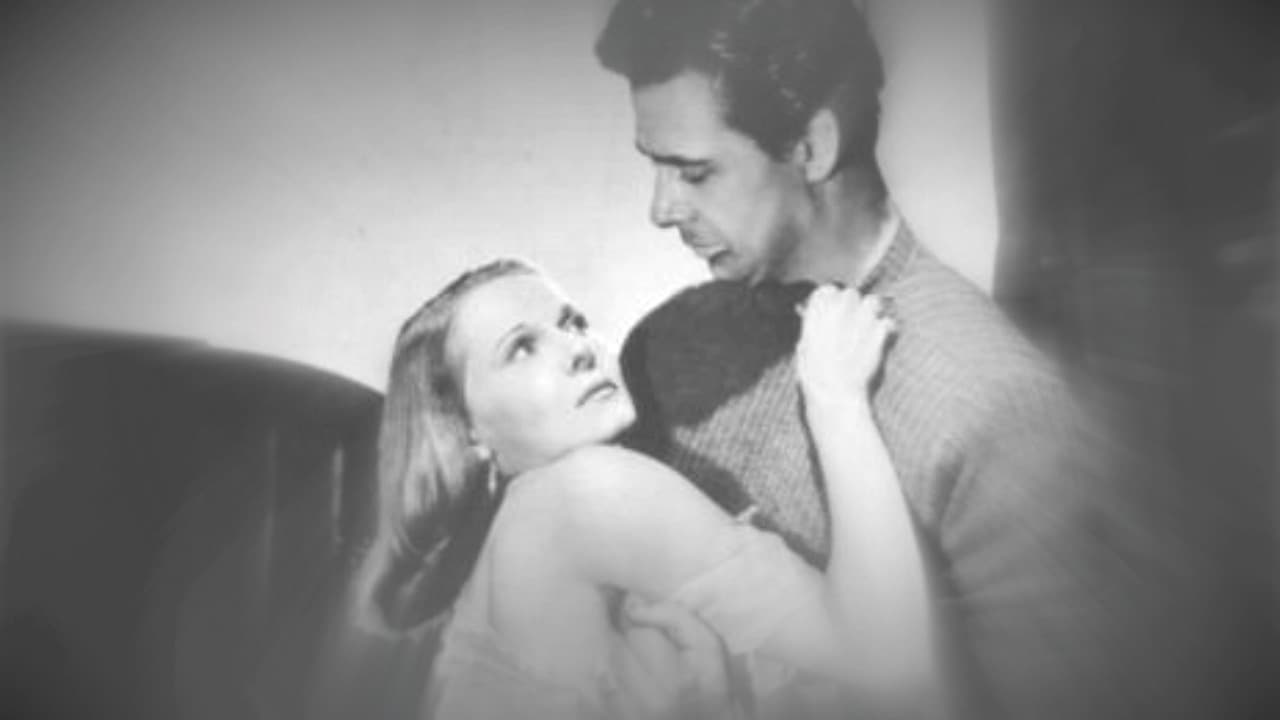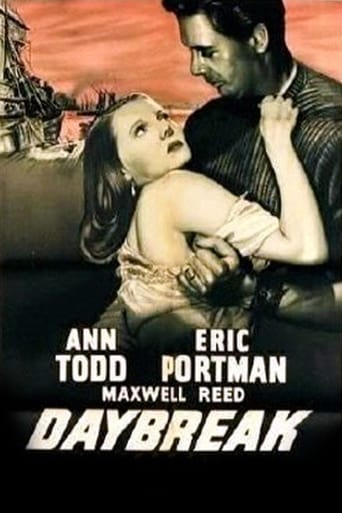

Eric Portman (Eddie Tribe/Mendover), Ann Todd (Frankie), Maxwell Reed (Olaf Tyson), Edward Rigby (Bill Shackle), Bill Owen (Ron), Jane Hylton (Doris, the barmaid), Garry Marsh (customer), Eliot Makeham (Bigley, the solicitor), Margaret Withers (Mrs Bigley), John Turnbull (police superintendent), Maurice Denham (police inspector), Lyn Evans (waterman), Milton Rosmer (prison governor).Director: COMPTON BENNETT. Screenplay: Muriel Box, Sydney Box. Story: Monckton Hoffe. Photography: Reginald H. Wyer. Film editors: Helga Cranston, Peter Price. Music: Benjamin Frankel, conducted by Muir Mathieson. Art director: James Carter. Costumes: Dorothy Sinclair. Make-up: Nell Taylor. Camera operator: Bernard Lewis. Assistant director: Basil Keys. Sound recording: John Mitchell, Stephen Dalby. Associate producer: A. Frank Bundy. Producer: Sydney Box.Not copyrighted in the U.S.A. Released through Universal- International in the U.S.A.: July 1949. New York opening at the Little Carnegie: 2 July 1949. U.K. release through General Film Distributors: 5 July 1948. Australian release through Fox: 7 July 1950 (sic). 7,389 feet. 82 minutes.SYNOPSIS: Eddie Tribe, a middle-aged, somewhat aloof but wealthy barge-owner, marries a young piece of flotsam without telling her of his two side jobs where he works under his Mendover alias: (1) barber; (2) public hangman.COMMENT: "Daybreak" is what the trade used to categorize as a difficult film. Its theme and unrelievedly downbeat atmosphere far too grim for both the cloth cap and carriage trade, the movie's only hope of success lay with the critics. Enthusiastic reviews have solved many a problem picture. But not so with this one. My review was probably the best of the lot, although Photoplayer was never the prestigious sort of magazine that could be quoted in advertising. Here it is: "Director Compton Bennett and scriptwriters Muriel and Sydney Box create quite an interesting and suspenseful atmosphere in this unusual melodrama — though they rather spoil it by showing the conclusion at the beginning of the film. And as a further consequence of this incredible piece of ineptitude, the film runs out of steam three-quarters of the way through and ends on a rather contrived and unsatisfying fade-out. "But the performances are superb — though Maxwell Reed makes a little too ludicrous a lover — as is the photography by Reginald Wyer, the seedy sets of art director James Carter, and the astute film editing of Helga Cranston and Peter Pryor."
... View MoreAccording to Quinlan this film was held back from release for 2 years because of problems with the censor.Since producers normally worked in co operation with the BBFC this does seem rather strange.Watching the film now and comparing it say with No Orchids For Miss Blandish it is difficult to understand what problems might have arisen.A more likely reason is the sheer grimness of this film.If it was made in 1945 it was hardly likely to appeal to an audience who had only recently been under attach from V2 weapons.So presumably the producers put it on the shelf waiting for a more appropriate moment to show.The film starts with Portman as the hangman approaching the cell of a condemned man and the mood goes down from there,if that is possible.The story is rather a mess and the pairing between Portman and Todd unlikely in the extreme.The ending is about as downbeat as you will ever find.Definitely not a film I would ever wish to see again!
... View MoreThis film is compelling for about the first third. British films could do naturalism so effortlessly then. I love the interiors - shabby rooms that still have (50-year-old) Victorian wallpaper, or fireplaces badly converted to ineffective gas fires. And the barber's shop with clients popping in and out and exchanging banter (the street it's in, though, is obviously a set with an omnipresent barrel-organ and someone always cycling carefully by). But then Ann and Eric go and live an idyllic, free, gypsy-like outdoor life on a Thames barge... There are some lovely shots of the riverbank with warehouses and cranes (now dull yuppie flats). The "living on a boat" fantasy was common in the late 40s/50s. Ann Todd as a happy wife seems to regress to childhood, skipping about wearing dungarees and flat shoes and being abominably cute. And the plot starts to roll... I rather like Maxwell Reed as a rule, even though he is wooden and 10 feet tall. But really, his Danish accent!
... View MoreIf you prefer films that are upbeat, positive and have a feel good air, then best to avoid this at all costs. However, for anyone who looks for a good storyline, with excellent casting and production values, then "Daybreak" is a rare gem. The story is both simple, and yet convoluted, but does break away from a lot of run of the mill stuff from that era of the late-40's. The only glaring problem, which detracts from making this film something of a minor classic, is the fact that it is obviously quite heavily censored. This simply results in some scenes becoming disjointed, and the flow of the film disrupted. However, this does not serve to spoil the film, but is a definite irritant. The ensemble playing by the cast is uniformly excellent. Eric Portman was always well worth watching, and Ann Todd probably produces her finest performance on screen. Edward Rigby and Bill Owen provide fine support, and that master of suppressed menace, Maxwell Reed, gives a typically dark and brooding performance, despite the dodgy Scandinavian accent! The film is not always easy to find, but is a rewarding experience for those that do find it. Just don't expect a joyous outcome!
... View More